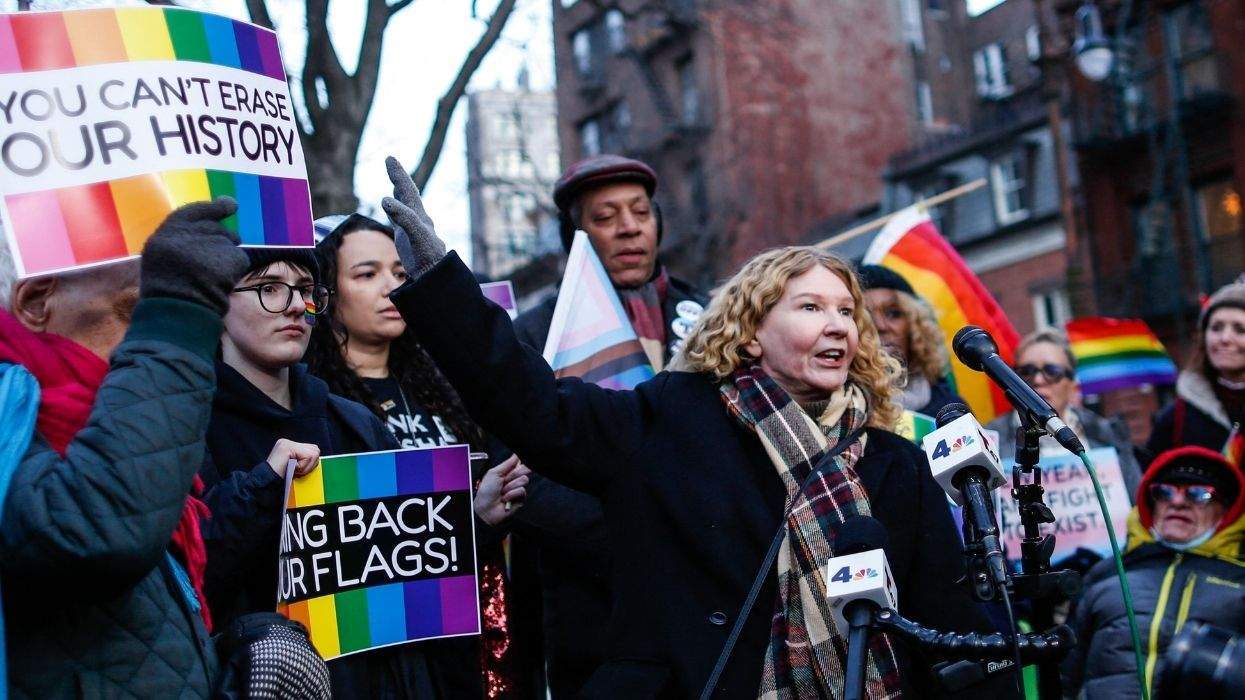While the intersex community celebrated a landmark moment this week when California became the first state to condemn surgeries on intersex children, the fight for intersex rights has yet to truly begin. As filmmaker River Gallo says, the first steps are explaining what it is and letting people know intersex people exist. Intersex is an umbrella term used for a variety of conditions in which a person is born with genitals that doesn't fit within typical definitions of male or female.
On this week's episode of LGBTQ&A, River talks about why it's a political statement to identify as intersex, how he's been objectified by the medical community, and how learning that he's intersex has caused him to embrace both the masculine and feminine sides of himself.
Read highlights from the interview here, or listen to the full podcast interview on the audio player below.
Subscribe to LGBTQ&A on iTunes, Spotify, Stitcher, or wherever you listen to podcasts.
Jeffrey Masters: When I learned about intersex people a few years ago, the term used was "ambiguous genitalia." We're actually trying to get away from that now, right?
River Gallo: Exactly. It implies the fact that there's a certain way the genitalia should look. Doctors are trying to correct bodies in order to fit the binary of male or female, but the truth is we can exist in healthy ways without having unnecessary surgeries, without doctors prescribing hormones to make us look either male or female. It's usually done at a very early age.
And these surgeries are cosmetic. They're not medically necessary.
Yeah. It's just the protocol. No other options were given to me. It's intimate. I mean it's the stuff you're told not to talk about. I've talked so much about my fake balls this year alone.
Talking so much about your privates with your doctors and parents, have you experienced a desexualization around them?
Definitely. The amount of times that we're told to like strip down to be examined, to have medical students look at us...every intersex person has stories where their bodies were objectified by the medical community. That's why we have this anger and this rage because it's like, "You guys didn't have our best interests in mind." It was a system that wanted to normalize us, not understand us for who we are inherently. New research shows that you can live healthy lives in your intersex body.
We've been talking as a community about how gender is not a binary this thing, and it's fascinating to know that our actual bodies also exist on a spectrum.
Yeah, definitely. It exists in nature, too: flowers, in the plant world, in the animal world. Animals are born intersex, so why as humans are we deciding that we need to normalize us?
It sounds like when the doctors told you about this condition, it was presented as a "problem" that only you had and not that there are many other people out there like you.
Not at all. And so it reinforces this idea of being alone. Intersex was known as a disorder of sexual development. The intersex community had a backlash towards that because when you say disorder, it's saying there's something wrong.
Intersex is a political statement now, outwardly identifying as intersex. By telling people who you are, it becomes a political act because no one knows what it is. It really takes the shame out of being intersex, just knowing we exist and that it's normal.
Being shamed by the medical community is a tradition that intersex people follow queer and trans people in. Until very, very recently, those were also things that were diagnosed and considered disorders.
Yeah. We have a history of the medical system thinking we're a problem. We almost have this wound in all of us, and you internalize it and think this is something that is wrong with me.
Did discovering this about your body change your relationship to your gender?
In my undergrad, I'd always go through these swings where I was really flamboyant and just feeling myself. And then I'd have these moments where it was just like, no, I need to be more masculine or dress more conservatively. Now, knowing I'm intersex makes me feel sometimes feminine and sometimes masculine. I wake up and can be whoever I want to be that day. I feel like the feminine and masculine energetically lives inside of me equally.
Being intersex has really taught me that it's OK to hold both of those things equally, to have them mean equal things to you, and that you don't have to try to be one or the other.
This interview has been edited and condensed. Subscribe and listen to the full podcast interview on LGBTQ&A.















Charlie Kirk DID say stoning gay people was the 'perfect law' — and these other heinous quotes
These are some of his worst comments about LGBTQ+ people made by Charlie Kirk.